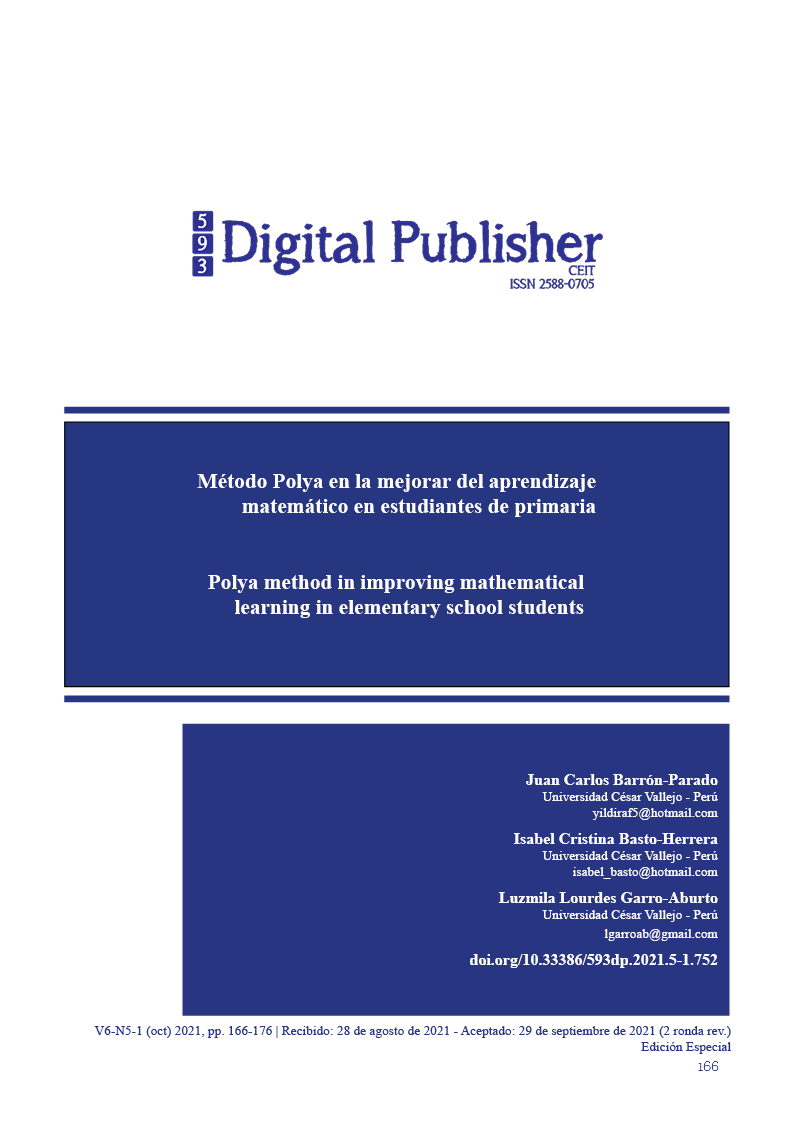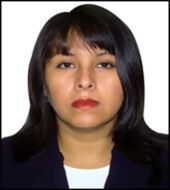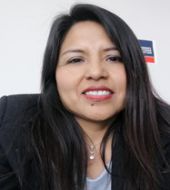Polya method in improving mathematical learning in elementary school students
Main Article Content
Abstract
Learning mathematics contributes to forming citizens capable of solving problematic situations by making use of skills and competences, therefore strategies and methodologies must be promoted to further strengthen them in the context of the pandemic. The main goal to improve learning achievement and grade competencies. In this sense, use is made of resources and technological tools that contribute to the achievement of the proposed objectives as well as theoretical foundations of constructivism, strategies and methodology for the development of learning sessions. The methodology used in the research is related to the quantitative approach, since through statistics the improvement of learning levels was verified, in terms of the type of research it was applied from an experimental - quasi-experimental design. The data collection instrument is an evaluation test of the ministry of education. In conclusion, the Polya method developed in the program increased the achievement of mathematical learning in students in the fourth grade of primary education.
Downloads
Article Details

This work is licensed under a Creative Commons Attribution-NonCommercial-ShareAlike 4.0 International License.
1. Derechos de autor
Las obras que se publican en 593 Digital Publisher CEIT están sujetas a los siguientes términos:
1.1. 593 Digital Publisher CEIT, conserva los derechos patrimoniales (copyright) de las obras publicadas, favorece y permite la reutilización de las mismas bajo la licencia Licencia Creative Commons 4.0 de Reconocimiento-NoComercial-CompartirIgual 4.0, por lo cual se pueden copiar, usar, difundir, transmitir y exponer públicamente, siempre que:
1.1.a. Se cite la autoría y fuente original de su publicación (revista, editorial, URL).
1.1.b. No se usen para fines comerciales u onerosos.
1.1.c. Se mencione la existencia y especificaciones de esta licencia de uso.
References
Arcavi, A. (2018). Towards an integrative vision of the teaching and learning of mathematics. Educacion Matematica, 30(2), 33–48. https://doi.org/10.24844/EM3002.02
Barriga, F., & Hernandez, G. (2005). Estrategias docentes para un aprendizaje significativo, una interpretacion cognitiva. http://creson.edu.mx/Bibliografia/Licenciatura en Educacion Primaria/Repositorio Planeacion educativa/diaz-barriga---estrategias-docentes-para-un-aprendizaje-significativo.pdf
Chaves, A. (2017). La educación a distancia como respuesta a las necesidades educativas del siglo XXI. Academia y Virtualidad, 10(1), 23–41. https://revistas.unimilitar.edu.co/index.php/ravi/article/view/2241/2519
Córdoba Pillajo, E. F., Lara Lara, F., & García Umaña, A. (2017). El juego como estrategia lúdica para la educación inclusiva del buen vivir. Ensayos - Revista de La Facultad de Educacion de Albacete, 32(1), 81–92. https://www.researchgate.net/publication/318429353_El_juego_como_estrategia_ludica_para_la_educacion_inclusiva_del_buen_vivir_The_game_as_a_fun_strategy_for_the_inclusive_education_of_good_living/link/5968cbeb0f7e9b80918e78b7/download
Cubas, J. C., & Sarmiento, M. Z. (2017). El currículo de la educación básica en tiempos de transformaciones: Los casos de México y Perú. Revista Mexicana de Investigacion Educativa, 22(72), 109–134. http://www.scielo.org.mx/scielo.php?script=sci_arttext&pid=S1405-66662017000100109&lng=es&tlng=es.
Díaz-Quezada, V., Poblete-Letelier, Á., & Gallardo-González, M. (2019). Rediseño curricular por competencias: experiencia en la formación inicial universitaria en Chile. Revista Iberoamericana de Educación Superior, X, 72–91. https://doi.org/10.22201/iisue.20072872e.2019.27.341
García-Peñalvo, F. J., Corell, A., Abella-García, V., & Grande, M. (2020). Online assessment in higher education in the time of COVID-19. Education in the Knowledge Society, 21, 1–26. https://doi.org/10.14201/eks.23013
Giacomone, B., Godino, J. D., & Beltrán-Pellicer, P. (2018). Desarrollo de la competencia de análisis de la idoneidad didáctica en futuros profesores de matemáticas. Educação e Pesquisa, 44(0), 1–21. https://doi.org/10.1590/s1678-4634201844172011
Grisales Aguirre, A. M. (2018). Uso de recursos TIC en la enseñanza de las matemáticas: retos y perspectivas. Entramado, 14(2), 198–214. https://doi.org/10.18041/1900-3803/entramado.2.4751
Hernández-Sampieri, R., & Mendoza, C. P. (2018). Metodologìa de la Investigaciòn. Las rutas Cuantitativa Cualitativa y Mixta. In universidad tecnologica laja Bajio. http://repositorio.uasb.edu.bo:8080/handle/54000/1292
Holguin García, F. Y., Holguin Rangel, E. G., & Garcia Mera, N. A. (2020). Gamificación en la enseñanza de las matemáticas: una revisión sistemática. Telos, 22(1), 62–75. https://doi.org/10.36390/telos221.05
Márquez Duarte, F. D. (2019). Modelo de Naciones Unidas: una herramienta constructivista. Alteridad, 14(2), 267–278. https://doi.org/10.17163/alt.v14n2.2019.10
McBurnie, C. (2020). The use of virtual learning environments and learning management systems during the COVID-19 pandemic. https://doi.org/10.5281/zenodo.3805843.
Minedu, 2016. (2016). Minedu, 2016. In Libro Currículo Nacional de la Educación Basica. http://www.minedu.gob.pe/curriculo/pdf/curriculo-nacional-de-la-educacion-basica.pdf
Minedu resultados 2019. (1377). Evaluaciones de logros de aprendizaje. 68–70.
Mineduc. (2012). Educación Básica Bases Curriculares. 256.
Ministerio de Educación, G. de C. (2009). Objetivos Fundamentales y Contenidos Mínimos Obligatorios de la Educación Básica y Media.
Peñaloza, M. y. (2019). Método de Pólya como estrategia pedagógica para fortalecer la competencia resolución de problemas matemáticos con operaciones básicas. In Zona Próxima (Issue 31).
Piaget. (1965). Lectura 1 Psicología Y Pedagogía.
Polya, G. (1965). Cómo plantear y resolver problemas. México: Trillas.
Tobón, S. (2004). Formación Basada en Competencias. Ecoe Ediciones, 1–286.
Torres Soler, L. (2018). La Matemática, Estrategia Para El Pensamiento Creativo. Revista Ingeniería, Matemáticas y Ciencias de La Información, 5(9), 23–31. https://doi.org/10.21017/rimci.2018.v5.n9.a37
Txabarri, G., & Javier. (2016). El empleo de estrategias en el aprendizaje de las Matemáticas en Enseñanza Secundaria Obligatoria The use of strategies for the learning of Mathematics in Compulsory Secondary Education. Revista de Investigación Educativa, 34, 487–502. https://doi.org/DOI: http://dx.doi.org/10.6018/rie.34.2.222901
Villamizar, L., Montenegro, W., & Salvador, J. (2012). Revisión teórica sobre la enseñanza y aprendizaje de las matemáticas Theoretical Review Mathematics on Teaching and Learning of Révision théorique sur l ’ enseignement et l ’ apprentissage des mathématiques. “Revista Virtual Universidad Católica Del Norte,” 35, 254–287. https://doi.org/http://www.redalyc.org/articulo.oa?id=194224362014 Cómo
Vygotsky, L. S. (1978). 09 y 13. Internalización de las funciones psicológicas superiores. El Dessarrollo de Los Procesos Psicológicos Superiores, 224.
Yangali Vicente, J. S., & Rodriguez Lopez, J. L. (2016). Aplicación Del Método Pólya Para Mejorar El Rendimiento Académico De Matemática En Los Estudiantes De Secundaria. INNOVA Research Journal, 1(10), 12–20. https://doi.org/10.33890/innova.v1.n10.2016.53




